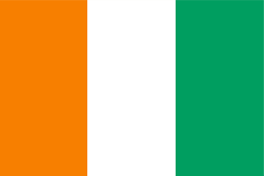 |
République de Côte-d’IvoireIndependence 7 August 1960
History In 1960, the independent Republic of Ivory Coast (RCI) keeps the name that had been attributed to it in the 15th century by Portuguese explorers and revived by French colonizers in 1893. The current territory of Ivory Coast corresponds to the French colony of the same name, which belonged to the eight-colony federation of French West Africa (AOF). The AOF becomes the French Community in 1958, which yields to the pressure of decolonization two years later. At the end of the Second World War, struggles for independence lead to the creation of the Syndicat agricole africain (1944) and an anticolonial political party, the Parti démocratique de Côte d'Ivoire (1946). Félix Houphouët-Boigny plays a major role in these two organizations. His electoral successes confirm his leadership of both, and he is eventually elected president of the RCI, which gains independence on 7 August 1960. Most of Houphouët-Boigny's presidency (1960-1993) is marked by one-party impediments to democracy, remarkable economic growth and rapid development of the health care and education systems. In the second half of the 1980s, the situation begins to regress. After the introduction of multipartyism in 1990 and Houphouët-Boigny's death in 1993, the RCI falls into political, social and then military turmoil. The nominations of subsequent heads of state – Henri Konan Bédié in 1993 and 1995, Robert Guéï in 1999 and Laurent Gbagbo in 2000 – are disputed. Since then, the impoverishment of significant portions of the population has gone hand-in-hand with profound differences of opinion on the question of who can or cannot claim full Ivorian citizenship. Fifty years after independence, the RCI is more than ever in search of a national vision supported by a majority of its citizens. Karel Arnaut (University of Ghent) |


